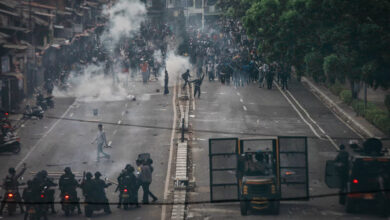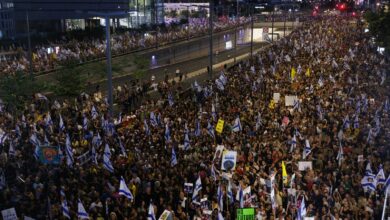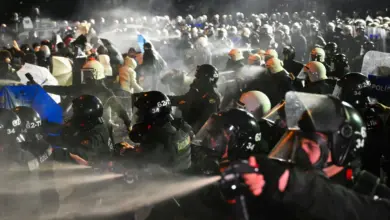Flags of different colours and copies of the Quran were raised Sunday in downtown Cairo where nearly five hundred secular and Islamist demonstrators rallied to protest the newly formed “illegitimate” parliament surrounded by thousands of riot police.
For almost two hours, supporters of various official and non-official opposition factions kept flooding to the scene echoing the same slogans:”The People's Assembly is void”, “Hosni Mubarak is illegitimate”, “Down with Hosni Mubarak”.
“All political factions are here to announce the illegitimacy of the ruling regime,” Gamal Fahmi, a prominent writer and an outspoken critic of the regime, told Al-Masry Al-Youm on the sidelines of the protest. “These shameless elections were the final nail in this regime’s coffin.”
The protest comes on the heels of a parliamentary poll that was marred by several electoral violations including ballot stuffing in favor of ruling National Democratic Party (NDP) candidates and the intimidation of non-NDP voters, according to local and international observers.
For his part President Mubarak, who also serves as the NDP president, said Sunday that the elections were lawful for the most part while acknowledging few irregularities. He related his party’s smashing victory to “good preparation and organization”.
The NDP came out of last week’s poll with nearly 80 percent of parliament's 508 contested seats, leaving no more than 15 seats to official opposition parties. As for the banned-but-tolerated Muslim Brotherhood, it came out of the race without any victory. By contrast, the Islamist group held one fifth of the seats in the outgoing parliament. As the results came out, the opposition contended that the new parliament should be dissolved.
“My presence here today is part of the Wafd party’s efforts to escalate the confrontation with [the regime],” Rami Lakkah, a leader of the liberal Wafd party, told Al-Masry Al-Youm.
“This escalation will continue until we oust this parliament, which came into being thanks to vote rigging and thuggery,” added Lakkah as he stood near his party’s flapping green flags.
Like all opposition groups, the elections dealt a blow to the Wafd party. In the first round, only two of the party’s more than 200 candidates secured seats, which provoked the Wafd to announce its full boycott of the run-off. Members who defied the party’s decision and engaged in the second race had their membership frozen last week.
Lakkah was one of many prominent opposition leaders who engaged fervently in the protest. Also in attendance were George Ishak and Abdel Halim Qandil from Kefaya; Osama Ghazali Harb, the president of the Democratic Front Party; Ayman Nour from Al-Ghad party; and Mohamed El-Beltagui from the Muslim Brotherhood. Some were raised on the shoulders of their supporters to shout slogans expressing their full disenchantment with the ruling regime.
For some protesters, Mohamed Elbaradei, the new rallying symbol for opposition, should have joined these key figures.
“His presence today would have been very important,” said 27-year-old Amr Ezz. “He could have mobilized a much bigger number of people because many of his supporters are waiting for him to take to the street so they can follow.”
On his part, Ahmed Maher, coordinator of the youth-based opposition group April 6, showed some understanding of Elbaradei’s reluctance to engage in such a protest.
“His presence in such small protests would not be beneficial,” said Maher. “As a symbol, Elbaradei should only appear in big demonstrations, and he said he would take to the street when there is at least 100,000 protesters in order to have a strong influence.”
Many observers hold that mobilizing such large numbers is hard for Egypt’s “elitist” opposition to achieve, as it falls short from operating at a grassroots level.
In February Elbaradei, a Nobel Prize Laureate, made news after expressing his willingness to run for president if real multiparty elections were held. Many young activists built momentum around this statement and threw their full backing behind the former head of the UN nuclear watchdog. A few weeks later, the National Association for Change was created under his auspices to advance seven reform demands, including the lifting of the state of emergency and a package of constitutional amendments. Yet Elbaradei-inspired groups were racked by divisions which some blamed on his continuous absence.
Elbaradei left Egypt in September, and returned last week to Cairo. Before his arrival, he posted a video online in which he dismissed the parliamentary elections, accusing the regime of “killing all opportunities for change.” He reiterated his threats to resort to civil disobedience in order to demand his reforms, but they continue to be ignored by the regime.




